#武士道 / bushido / the way of the warrior
Explore tagged Tumblr posts
Text
During the main quests, this appears p often. It literally means "Jin's Journey":
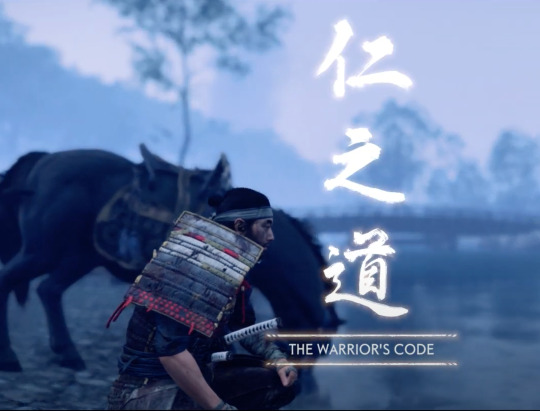
But the kanji for "Jin" -- 仁 -- also means "benevolence," emphasizing a respect for humanity. So 仁之道, while it means "Jin's Journey," can also be read as "the path/way of benevolence."
He isn't following the bushido, or 武士道,the way of the warrior/samurai, but rather 仁之道, the way of benevolence, a path that diverts sharply from the "honor" that samurai follow.
#should probably disclaim that i'm chinese so there might be a few nuanced differences in japanese?#the gist is still there though#ghost of tsushima#gots#sakai jin#tears falling like peridots#jin sakai#gots meta#ghost of tsushima meta#i have a lot of feelings about jin's name ever since i saw the kanji#there's nothing that fits him better#仁 implies a deep and visceral love for humanity#but it can take it a step further for all living things#which fits for jin he throws everything away because he values all human life and his island#and not even just human life he respects the foxes and animal life on the island too#his father is the wind and his mother is the yellow bird#he's respectful of all life human animal and so in tune with nature#all the seemingly inconsequential things#there's no better name for him
133 notes
·
View notes
Text
自制 (jisei) "self-discipline" - the eighth virtue of 武士道 (bushidō)
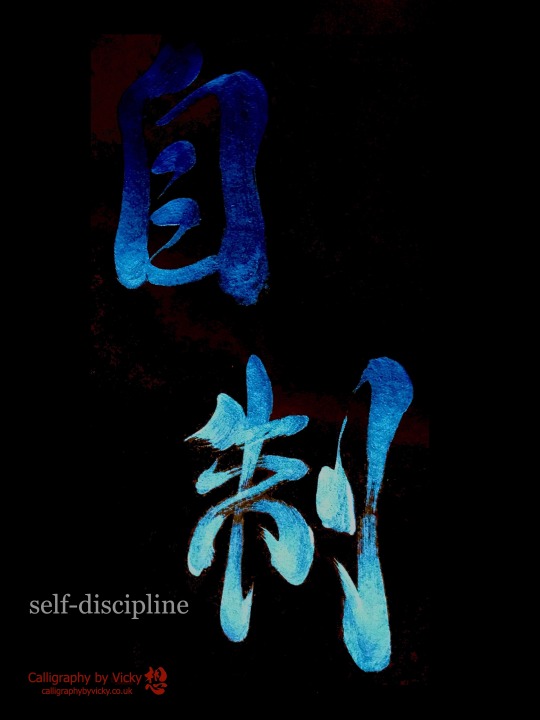
Recently I've been researching 武士道 (bushidō) - the ancient Japanese way of the warrior, mostly to try to figure out if it ever was actually a legit thing, or if it's a modern invention.
Spoiler alert: it's a bit of both. You can read my conclusions in my Medium article here.
Bushidō comes with a handy list of 8 virtues that one can follow to lead one's best and most noble life. You may not have been born a samurai, but you can still live like one by following this code.
The eighth virtue is “Self-Control”, which I have translated as "self-discipline", for reasons explained below.
These 8 virtues were first mentioned in Nitobe Inazao's 1899 book "Bushido: the Soul of Japan".
When introducing “self-control”, Nitobe brings together previous virtues: “The discipline of fortitude (勇 (yū) courage) on the one hand, inculcating endurance without a groan (名誉 (meiyō) reputation), and the teaching of politeness (礼 (rei) respect) on the other, requiring us not to mar the pleasure or serenity of another by manifestations of our own sorrow or pain, combined to engender a stoical turn of mind.”
Nitobe makes it clear that this “stoical” behaviour was considered a virtue: “It was considered unmanly for a samurai to betray his emotions on his face… The most natural affections were kept under control.”
Such strict “control” of one’s emotions may seem excessive and unnecessary to a modern Western audience, which is why I have “translated” this virtue as “self-discipline”. With the previous seven virtues as a guide, one can use discipline to make a conscious effort to guide one’s life in a positive direction.
#書道#japanese language#japanese calligraphy#japanese art#japanese culture#japanese langblr#calligraphy#japan#japanese#kanji#Asian art#bushido#samurai#Japanese history#japanese history#武士道
72 notes
·
View notes
Text
Research of Bushido and the Samurai Class
The samurai, a distinct warrior class in Japanese history, played a pivotal role in shaping Japan’s social, political, and cultural landscape. Central to their identity was the concept of bushido (武士道), or the "Way of the Warrior," a moral and ethical code that governed their behavior and worldview.
1. The History of Samurai and the Samurai Class
The samurai class emerged during the Heian period (794-1185) and rose to prominence during the Kamakura period (1185-1333). Initially serving as armed guards for the aristocracy, samurai became political and military leaders. They upheld values such as loyalty, courage, and discipline. During the Edo period (1603-1868), the samurai transitioned from warriors to bureaucrats under the Tokugawa shogunate, which emphasized peace and stability.
Key historical milestones:
Heian Period: Early emergence as military retainers.
Kamakura Period: Establishment of the first samurai-led government.
Sengoku Period: Height of samurai military dominance during feudal wars.
Edo Period: Samurai became stewards and scholars, maintaining their identity despite declining military roles.
2. The Spirit of Bushido
Bushido is an ethical system influenced by Confucianism, Buddhism, and Shinto. Core values include:
Gi (義): Rectitude and justice.
Yu (勇): Courage.
Jin (仁): Benevolence.
Rei (禮): Respect.
Makoto (真): Honesty and sincerity.
Meiyo (名譽): Honor.
Chūgi (忠義): Loyalty.
These principles defined a samurai’s duty to their lord, family, and society. The spirit of bushido emphasized self-discipline, self-sacrifice, and an unwavering commitment to one’s moral code, even at the cost of one’s life.
3. The Influence of Shintoism on Bushido
Shintoism, Japan's indigenous spiritual tradition, played a critical role in shaping bushido. Rooted in the worship of nature, reverence for ancestors, and loyalty to the emperor, Shintoism provided foundational values that complemented and enhanced bushido’s ethical code. Key influences include:
Loyalty to Sovereign and Duty: Shintoism’s emphasis on the divine origin of the imperial family instilled a profound sense of duty and patriotism among samurai. This loyalty extended to their feudal lords, reinforcing the hierarchical structure central to samurai life.
Reverence for Ancestors: Samurai adopted Shintoism’s respect for ancestral lineage, integrating it into their commitment to uphold their family’s honor through exemplary behavior.
Purity and Nature: Shinto’s focus on purity rituals and respect for natural forces encouraged samurai to cultivate discipline and maintain harmony with the world around them. This perspective also contributed to the aesthetic sensibilities seen in samurai art, poetry, and the way of the sword.
Shinto ideals of harmony and reverence harmonized with Buddhist and Confucian elements to create a well-rounded moral framework for bushido.
4. Literary and Philosophical Foundations
Bushido’s philosophy was documented in classical texts and later interpreted by scholars and thinkers:
"Hagakure" (葉隠れ) by Yamamoto Tsunetomo: A guide to living and dying as a samurai.
"Go Rin No Sho" (五輪書) by Miyamoto Musashi: A treatise on strategy and the way of the sword.
"The Book of Bushido" by Inazo Nitobe: Introduced bushido to Western audiences, connecting it with chivalry and ethics.
"The Chrysanthemum and the Sword" by Ruth Benedict: A landmark anthropological study of Japanese culture, written during World War II. Although not solely focused on bushido, it discusses the broader Japanese values, including honor, shame, and duty, which align with bushido principles. Benedict’s analysis helps contextualize the samurai’s moral framework within Japan’s cultural ethos.
"Zen and Japanese Culture" by D.T. Suzuki: Examines how Zen Buddhism influenced bushido and samurai practices, particularly in fostering discipline and mindfulness.
These works provide critical insights into the samurai'S mindset and the broader cultural context of bushido.
5. The Impact of War, Politics, and Society
The evolution of the samurai class was deeply intertwined with Japan’s political and social environment. The constant warfare of the Sengoku period forged a martial ethos, while the Edo period’s relative peace led to a focus on governance, culture, and scholarship. The Meiji Restoration (1868) marked the end of the samurai as a formal class, though their legacy persisted through modern institutions and ideals.
6. The Living Environment of Samurai
Samurai lived structured lives influenced by their status and duties:
Residences: Samurai resided in castle towns near their lords.
Diet: Meals typically consisted of rice, fish, and miso soup.
Education: Samurai were educated in martial arts, literature, and philosophy.
7. Modern Interpretations of Bushido
In contemporary culture, bushido is often romanticized and interpreted as a symbol of honor and perseverance. Modern media reflects bushido’s ideals:
Movies: "The Last Samurai," "Seven Samurai," and "Rurouni Kenshin."



Books: Works by Yukio Mishima and novels like "Musashi" by Eiji Yoshikawa.

Games: Samurai values are explored in anime and video games such as "Ghost of Tsushima."

0 notes
Text
What is the meaning of Bushido?
Without doubts, we can say that samurais are something that had inspire people to become stronger and powerful. We had seen about their culture through many books, media and now the internet. What is Bushido? we can read in wikipedia the following: “Bushidō (武士道, “the way of the warrior”) is a moral code concerning samurai attitudes, behavior and lifestyle,[1][2][3] formalized in the Edo…
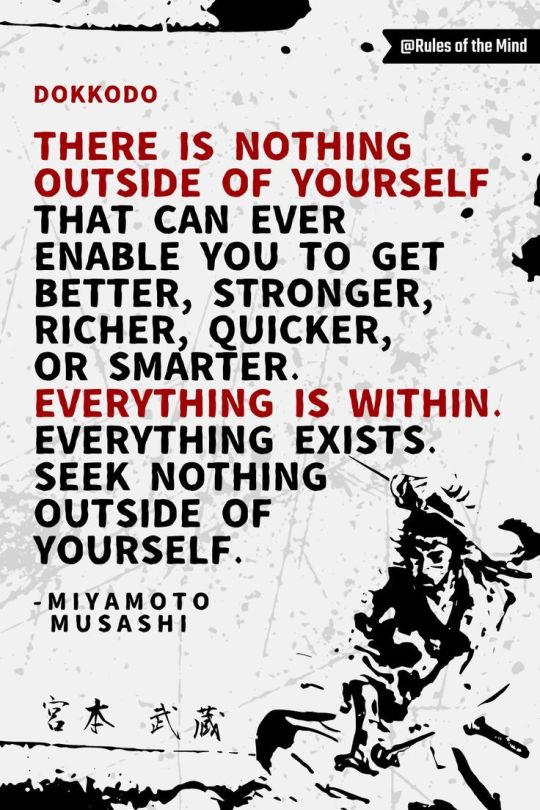
View On WordPress
0 notes
Photo
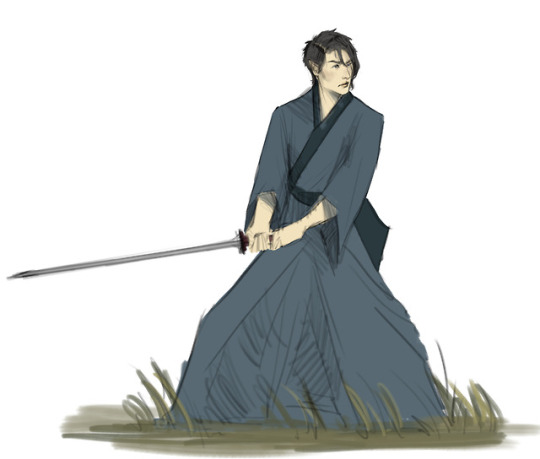
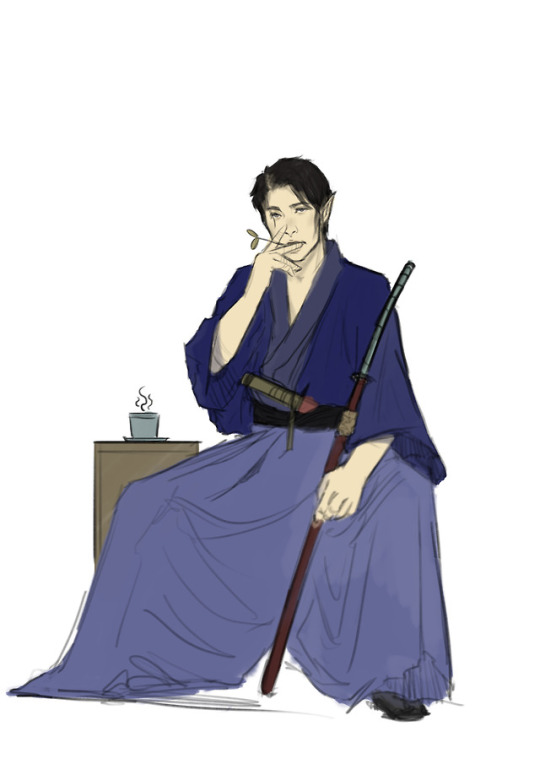
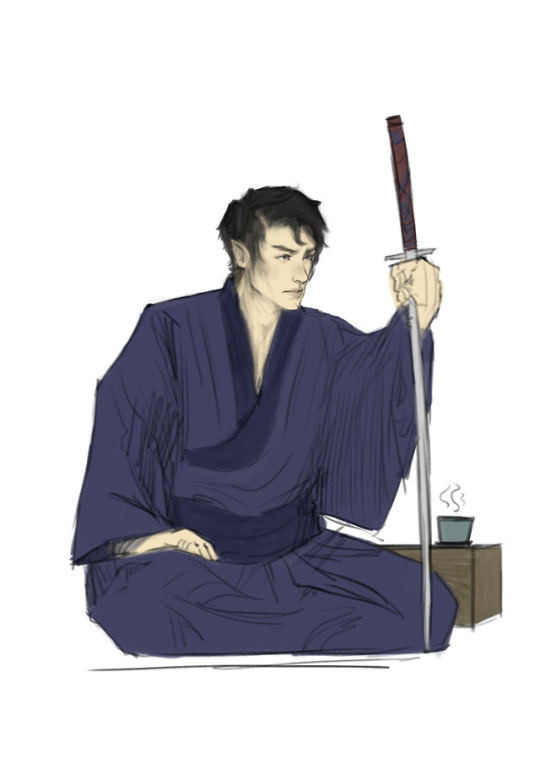
The Hero of Ferelden, 武士道
They say the mother of the warden teached him the way of the warrior until her death. Tomoe was the last of her clan and now he is. They call him Masamune even if Thedas knows him as the warden Archibald Tabris.
I commissioned @mraeelli, thankyou so much for your amazing work !
#dragon age#oc : archibald tabris#the hero of ferelden#the warden#mraeelli#thankyou so much !!!!! ♥#he looks wonderful.#(and i'm so sorry to post this so late jade iefhevfdk)#quizzi ocs#gorgeous art indeed#look at my beautiful son omfg#the beauf warden#quizzi fave#武士道 / bushido / the way of the warrior
235 notes
·
View notes
Text
“But sensei Bushido demand we fight for honer and justice and-“
Bushidō (武士道, "the way of the warrior") is a moral code concerning samurai attitudes, behavior and lifestyle.There are multiple bushido types which evolved significantly through history.
There 7-8 code
1 justice
2 courage
3 mercy
4 politeness
5 honestly and Sincerity
6 honor
7 loyalty
8 self control
10 notes
·
View notes
Photo
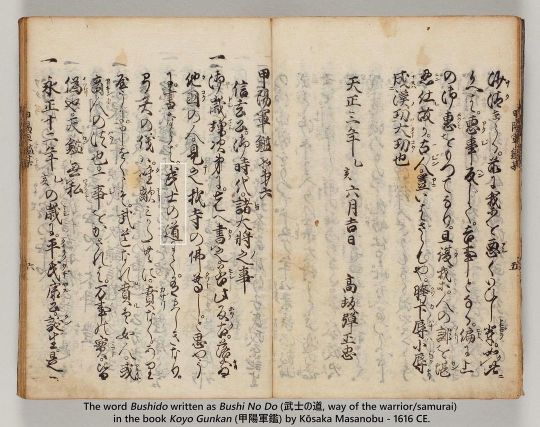
READ IN FULL | BUSHIDO (武士道 ) Y'all know that I've made countless videos, posts and lessons on "The Way"... This is commonly called "Bushido", meaning: The Way of the Warrior. This is a set of moral principals on how to conduct yourself and live your life by. "The Way" is something that I live by and I expect all members of the Budo Ryu Kai to do this same. . Many times, I've see "online researchers" say that "BUSHIDO" did NOT exist in the age of the samurai. These same "online researchers" say that the term "BUSHIDO" was first used in a book called: "Bushido: The Soul of Japan" written by Inazō Nitobe, published in 1900. THIS IS NOT TRUE! . To start, I am honored to say that I own this book written by Inazō Nitobe! I own a 1st edition of this book written in the year 1900! Here is the link, it is a great book! I also want to say to all of my students and supporters that yes, I do expect all members of the Budo Ryu Kai to hold themselves to a higher set of standards known as "THE WAY" (This book will be released soon). . Despite many online researchers who make a ridiculous claims, the first time that we see the term "Bushido" was used in a historical document called the: "Kōyō Gunkan (甲陽軍鑑)" compiled largely by the Takeda samurai Kōsaka Danjō Masanobu and completed in 1616 by Obata Kagenori. . JOIN THE ONLINE NINJUTSU DOJO! Study The Ancient Ninja Martial Art Called: “Ninjutsu”! 👺 ⛩ BudoRyuNinjutsu.com . Do you live in Kansas City? Call us for a FREE TRIAL CLASS! ☎️ (913) 449-5367 . Don’t Live in Kansas City? Join The Online Ninja Dojo! ⛩ BudoRyuNinjutsu.com . #MartialArts #Ninjutsu #Ninpo #Bujutsu #Budo #Kobujutsu #Kobudo #Shinobi #Shinobijutsu #Kenjutsu #Kendo #Iaijutsu #Iaido #Iai #Taijutsu #Jujutsu #Karate #Judo #Aikido #Koryu #KoryuBujutsu #TraditionalMartialArts #JapaneseMartialArts #Samurai #Warrior #武士道 #Bushido #TheWay #TheWayOfTheWarrior #TheWayOfTheSamurai https://www.instagram.com/p/CO5c9PKpfL_/?igshid=xrlsor4phqxv
#martialarts#ninjutsu#ninpo#bujutsu#budo#kobujutsu#kobudo#shinobi#shinobijutsu#kenjutsu#kendo#iaijutsu#iaido#iai#taijutsu#jujutsu#karate#judo#aikido#koryu#koryubujutsu#traditionalmartialarts#japanesemartialarts#samurai#warrior#武士道#bushido#theway#thewayofthewarrior#thewayofthesamurai
9 notes
·
View notes
Note
Have you found anymore info on Nagoriyuki's profile? A friend of mine said he is into Takeshido films and has a limited version of swordmanship. Not to be 'rude' about this character but my friend is beginning to think Nagoriyuki might be a 'tryhard' with the Japanese culture.
Not "entirely" clear on the text, because, again, the limited Famitsu info we have was very small and my OCR kanji reading program can only give me so much.
I think your friend 'misread' the passage.
The passage in question is Nagoriyuki's values: which I guess reads as "A Limited perspective on Bushido".
武士道
"Limited" perhaps, because Nagoriyuki is a Vampire, and probably cannot fully comprehend the concept of Death (being nigh immortal and all).
I've already talked about Bushido (and Dandyism) to an extent and what it means to a warrior such as Nagoriyuki.
Also, given that Nagoriyuki appears to be from Nigeria, adopting Japanese culture on his part is not unlike something Chipp Zanuff has done in the past, even if his origins lie in America.
Even Johnny adopted the ways of Eastern Iaido (the Way of Harmony) despite being born in America as well.
There's nothing wrong with putting in the effort to improve one's self, though one should never overstep one's limits to their detriment if possible.
8 notes
·
View notes
Text
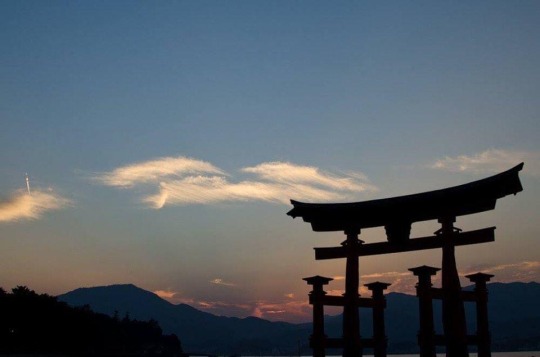
武士道
The Bushido consists of seven virtues. These virtues are the heart and soul of the Samurai. These virtues are: 清廉 (Integrity), 尊敬 (Respect), 勇気 (Courage), 名誉 (Honour), 同情 (Compassion), 正直 (Honesty), 忠義 (Loyalty). The word Samurai, (侍) means "to serve". To truly understand the Way Of The Samurai, you must understand the Bushido.
清廉 - Integrity is a good beginning for the warrior’s code of ethics, before applying any other moral virtue. Everything starts with your integrity, it is the moral fiber that holds all the other pieces together. Without integrity, there is only disintegration. The degree to which we live with integrity is reflected in anything we say and do. People around us can sense our integrity, even though it is an inner trait. It is for ones own growth as a spiritual being. Integrity gives us the discernment in thought, speech, and in action.
尊敬 - Respect in the world of the samurai can be seen as a little bit parallel to compassion, in the sense that it stems from a sympathetic regard for the feelings of others. In its highest form politeness approaches love. To respect others you need to first respect and value yourself. To be able to respect the feelings and opinions of others and use politeness to harmoniously keep connections meaningful is an important virtue and skill to have.
勇気 - Courage is one of the first associations we make with warriors, both those in battle and those in spirit. To live life completely, one must have courage. It is the courage that we summon in our heart when we step out into the world and take action, even though we still have some fears and uncertainty about it. It is that energy that initiates a lot of changes that takes us far and forward on our path.
名誉 - Honour is one of the highest virtues because it captivates and motivates the heart of the warrior to fight with valour and to summon up the courage from the heart. Honour is a goal as much as it is a way of being, as it is the spirit warrior’s way of life. Warriors have only one judge of honour and character, and this is themselves. The decisions one makes and how these decisions are carried out is a reflection of whom one truly is.
同情 - Compassion is a very noble virtue and holds up high in importance and value. It centers us in the power of the heart space, which is the source of so many other beautiful qualities and feelings such as understanding, benevolence, sympathy, love and empathy. Without nurturing compassion, you can’t sail very far in the great ocean of life, for you are surrounded by so many sentient beings that are both a reflection of you and coming out from the same source as yourself.
正直 - Honesty is the beauty of the warrior. It is both the sword, the shield and the armor. Always stay firm in your truth and speak and express it with courage. Truth is the cornerstone of any human interaction, it is the foundation of how we view the world and how we are viewed by it. The choice to represent oneself or situation truthfully may initially be painful but those momentary feelings will be nothing compared to the pain that could be caused down the line when one is living a lie, to themselves and to others.
忠義 - Loyalty is about placing your feeling, your efforts, commitments and resolutions where it matters most for your own freedom and spiritual development, and those of others. It is rooted in the practice of being loyal to one’s own feelings and intuitions first and then placing your loyalty and trust where it should belong. Warriors are responsible for everything that they have done and everything that they have said, and all of the consequences that follow. Loyalty will then build amongst those who share the same principles and way of life.
武士道
19 notes
·
View notes
Text
@Shiroyama 城山
https://www.youtube.com/watch?v=exoSm1KSa3M
サバトンという1999年結成のスウェーデンのグループが歌っている。男性5人のグル―プで、戦争をテーマにした曲を歌うことが多い。この歌は鹿児島で1877年に起きた西南戦争についてのもの。この戦争は明治初期に起こったいくつかの士族による反乱の最大の物で、国内最後の内戦であった。
A Swedish group, Sabaton sings it.
It is a group of 5 men and they often sing about war.
This song is about Seinan war in Japan(1877).
This is a war occurred by Samurai (=worrier) and was the last biggest one.
首謀者の西郷隆盛は、徳川幕府を倒して新政府の立役者になったが、当時の日本人には「日本国」という視点はなく、あくまで藩(西郷にとっては薩摩藩)主体の考え方だった。つまり薩摩が徳川に替わって政権を取ると言うつもりだったが廃藩置県により、藩がなくなったため混乱が始まった。
The boss, Takamori Saigo overthrew Tokugawa government, and he became one of the highest offecers of the new government.
In those days, Japan was divided into tens of districts which ruled by their own lords.
But the new government decided to abolish this system and moved to centralization.
So the confusion began.
事情は複雑だが、最終的には西郷が負けて自決。この後日本では本格的な官僚主導の政治が始まり、紆余曲折を経ながら、現在まで続いている。
At last Saigo lost and killed himself.
After that in Japan politics by bureaucracy began, and it continues still.
歌詞と意味
It's the nature of time
That the old ways must give in
It's the nature of time
That the new ways comes in sin
When the new meets the old
It always end the ancient ways
And as history told
The old ways go out in a blaze
Ebcircled by a vulture
The end of ancient culture
The dawn of destiny draws near
Imperial force defied, facing 500 samurai
Surrounded and outnumbered
60 to 1 the sword face the gun
Bushido dignified
It's the last stand of the samurai
Surrounded and outnumbered
As a new age begins
The way of the warrior comes to an end
As a new age begins
The ways of the old must apprehend
It's the nature of time
That the old ways must give in
It's the nature of time
That the new ways comes in sin
An offer of surrender
Saigo ignore contender
The dawn of destiny is here
Imperial force defied, facing 500 samurai
Surrounded and outnumbered
60 to 1 the sword face the gun
Bushido dignified
It's the last stand of the samurai
Surrounded and outnumbered
Until the dawn they hold on
Only 40 are left at the end
None alive, none survive
Shiroyama
Imperial force defied, facing 500 samurai
Surrounded and outnumbered
60 to 1 the sword face the gun
Bushido dignified
It's the last stand of the samurai
Surrounded and outnumbered
60 to 1, facing the gun
60 to 1, culture undone
それが時間と言うものだ
古いやり方が負ける
それが時間というものだ
新しいやり方がそむく
新しいものが古い物に出会う時
それは常に古いやり方の終わりだ
歴史が教えるように
古いやり方は燃えてしまう
コンドルに囲まれて(encircled?)
古い文化の終わり
運命の夜明けは近い
天皇の軍隊は立ち向かった 500人の侍は
敵に囲まれ 少ない数で
60対1で 剣で銃に向かって
威厳ある武士道で
侍の最後の姿
敵に囲まれ 少ない数で
新しい時代が始まる時
戦士のやり方は終わる
新しい時代が始まる時
古いやり方の人は理解すべきだ
それが時間と言うものだ
古いやり方が負ける
それが時間と言うものだ
新しいやり方がそむく
降伏の申し出を
西郷は相手を無視する
運命の夜明けは今だ
天皇の軍隊は立ち向かった 500人の侍は
敵に囲まれ 少ない数で
60対1で 剣で銃に向かって
威厳ある武士道で
侍の最後の姿
敵に囲まれ 少ない数で
夜明けまで彼らはがんばる
最後に残ったたった40人は
誰も生きていない 生き残っていない
城山に
天皇の軍隊は立ち向かった 500人の侍は
敵に囲まれ 少ない数で
60対1で 剣で銃に向かって
威厳ある武士道で
侍の最後の姿
敵に囲まれ 少ない数で
60対1で 剣で銃に向かって
60対1で 文化は終わった
6 notes
·
View notes
Text
B # 5
The Invisible Hand in Japan & Daily Life in a Japanese Company
Blog Entry - Chapter #5
The Invisible Hand in Japan
A concept the Japanese people embrace whole-heartedly is working for the betterment of their family, company, community and country. As the author mentioned, Japanese people would work long hours and work overtime, even without pay, for the sake of their company. It is even mentioned that a Japanese is often a life-long, loyal employee of a company. These qualities stems from the previously mentioned Japanese concept of Bushido (武士道) or the way of the warriors, where Japanese people are fiercely loyal to their leader and company. This also is combined with common Japanese concept of Ganbaru (頑張る), which is often roughly translates to doing one’s best. It is the trait of perseverance and giving it your all for the task and the goal. Both are motivated by the vision of everyone working selflessly for the community and so everyone will benefit from it as well. Japanese believe that if you work hard to fulfil the community needs, you will automatically achieve your individual aim.
“Both visions are equally valid: individualism focused on personal interest, automatically obtaining benefits for society and consumers; or, on the other hand, giving everything to society and your company and thus, automatically obtaining personal benefits” - H. Garcia, The Invisible Hand in Japan

Image: One for All, All for Japan
✹ Without getting too political, the United States is a capitalistic society. One of the concept that falls under the Capitalism is Competitiveness (1). It has two meaning in terms of society and in terms of economics. In economics, it is the standing rule that no company may have monopoly of an industry or product. However, in terms of society, it is the concept that we improve through competition. Two parties or two individual have to compete for individual gains, allowing us to be motivated to do better each time. Another difference is that often times, Americans in the United States see that people’s success are defined by one’s hard work. A popular view Americans often have is that the other person should not benefit from the effort they put in, especially when the other person did not put in the same effort. However, they do believe in the common use phrase, “giving back.” They believe in giving back to the community or an organization that have helped them in some way. Americans of all ages can volunteer at various places, such as the FoodBank, the hospital, the park, etc.
❇ I tend to do lean more towards the concept of “One for All, All for One” (一人はみんなのために、みんなは一人のために). However, how it will work out depends on the culture of the country. Japan has a long history of strong loyalty for their lord, their company, and country, while United States has a long history in opposing monarchies and nearly anything that is against capitalism. I believe people have a civil duty to work to better their society and country. I personally believe an effort we can all work to benefit everyone. However, I also believe in giving credit where credit is due. I believe in allowing a person to put in their hard work and benefit from it and achieve their personal goals
~~~~~~~~~~~~~~~~~~~~~~~~~~~~~~~~~~~~~~~~~~~~~~~~~~~
Daily Life in a Japanese Company
From the media to the author and his personal experience, Japanese people have always been portrayed as taking their business etiquette very seriously. The author told a story of his coworker being always polite when asking anything business-related, even though he has been with the company for a while and they essentially have already treated him like family outside of work. Japanese people’s behavior could be drastically different from when they are at work and when they are at a company outing after work. A coworker could call you sir / ma’am or Mr. / Ms. at work but will treat you like a best friend when going out to restaurants. When comes to business, they believe their attitude, appearance and behavior are a representation of who they are. The author also mentions that Japanese as a society always observe business etiquette such as bowing to superiors, like your manager, your director and even guests from outside the company.
“It’s funny how, after working for more than two years with the same people every day, getting along with them wonderfully and considering them as though they were part of my family, they still bow and use formal language before asking me for anything at work”
- H. Garcia, Daily Life in a Japanese Company

Image: Maintaining Politeness at All Times
✹ In the United States, business etiquette is much more lax, and it varies from one company to another. As society, business etiquette are observed based on necessities and importance. Although as a society, we do not bow to our superiors, we certainly have to dress appropriately and speak appropriately to them. When comes to important or crucial meetings, coworkers will act professional amongst each other until they are done with it. As the author mentions, the dynamic of an office in America is much more laid back, and your interaction depends on how well you know your coworker and even superior. A relaxed dynamic is often seen as the ideal working environment for some people.
❇ Personally, I believe there should be a balance of both attitude. There is a time and a place for everything, as they would say. I can agree with the attractiveness of always displaying professionalism at work. Always being professional at work is a representation of how serious the worker takes his/her work. It also set the standard of politeness, attitude and respect company-wide and industry-wide. However, if circumstances at work allows a more relaxed attitude to boost morale of the team, formality could be dispense with until it is necessary. We must all maintain professionalism at all times, but a worker could relax if talking to someone they know well, without breaking their professionalism.
—————————————————————————————— Quotes from Chapter 5: The Japanese at Work - Garcia, H. (2012). Geek in Japan: Discovering the Land of Manga, Anime, Zen, and the Tea Ceremony. Tuttle Publishing. Kindle Edition.
(1) Zucchi, K. (2019, February 24). Main Characteristics of Capitalist Economies . Retrieved from Investopedia: https://www.investopedia.com/articles/investing/102914/main-characteristics-capitalist-economies.asp
2 notes
·
View notes
Text
勇 (yū) "courage" - the second virtue of 武士道 (bushidō)
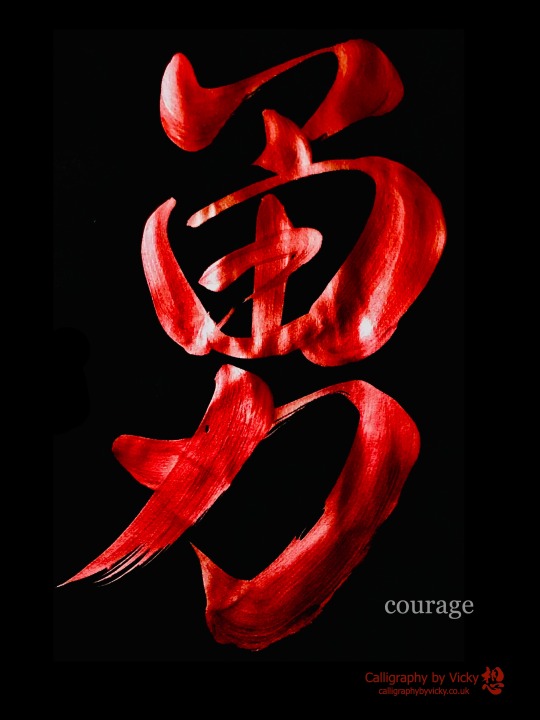
Recently I've been researching 武士道 (bushidō) - the ancient Japanese way of the warrior, mostly to try to figure out if it ever was actually a legit thing, or if it's a modern invention.
Spoiler alert: it's a bit of both. You can read my conclusions in my Wordpress article here.
Bushidō comes with a handy list of 8 virtues that one can follow to lead one's best and most noble life. You may not have been born a samurai, but you can still live like one by following this code.
The second virtue is “Courage, the spirit of Daring and Bearing”.
These 8 virtues were first mentioned in Nitobe Inazao's 1899 book "Bushido: the Soul of Japan".
He describes "courage" as “bearing” as well as “daring”, which suggests that courage has a broader meaning than merely courage in battle; it also includes enduring difficult situations.
He goes on to say: “Courage was scarcely deemed worthy to be counted among virtues, unless it was exercised in the cause of Righteousness.” This implies that true courage comes from knowing what is right, having the clear-sightedness to understand one’s own values and to hold by them, whatever the situation. It is necessary for courage to be informed by 義 (gi) integrity .
#書道#japanese language#japanese calligraphy#japanese art#japanese culture#japanese langblr#calligraphy#japan#japanese#kanji#Asian art#bushido#samurai#Japanese history#japanese history#武士道
59 notes
·
View notes
Text
A Study on the Teachings and Living Environment of Japanese Monks
Historical Development of Japanese Buddhism Buddhism arrived in Japan from Korea in the 6th century during the Asuka period, facilitated by the introduction of Chinese texts and practices. Early adoption faced resistance from Shinto adherents, but under Prince Shōtoku’s patronage, Buddhism flourished. Significant developments include:
Nara Period (710–794): Centralized under imperial authority, temples like Tōdai-ji and schools such as Kegon emerged. Kegon emphasized interdependence, based on the Avatamsaka Sutra (华严经).
Heian Period (794–1185): Saichō founded Tendai, promoting the universality of Buddha-nature and Lotus Sutra (法华经) teachings. Kūkai introduced Shingon Buddhism, emphasizing esoteric practices and mystical experiences.
Kamakura Period (1185–1333): Political turmoil led to the rise of accessible schools: Pure Land, founded by Hōnen, emphasizing faith in Amida Buddha; Zen, brought by Eisai and Dōgen, focusing on meditation and discipline; and Nichiren Buddhism, stressing the exclusive importance of the Lotus Sutra.

Modern Period: Meiji-era reforms separated Shinto and Buddhism (Shinbutsu-bunri), leading to challenges but also revitalization.

Doctrinal Changes and Sectarian Differences Japanese Buddhism encompasses diverse schools:
Tendai: Emphasizes "enlightenment for all," based on the Lotus Sutra, combining meditation, ritual, and scholarly study.
Shingon: Focuses on esoteric rituals using mantras, mudras, and mandalas to access hidden truths.
Pure Land: Centers on salvation through faith and the nembutsu chant (念佛): "Namu Amida Butsu."
Zen: Advocates intuitive insight through zazen (坐禁) and koan (公案) practice.
Nichiren: Promotes "Nam-myōhō-renge-kyō" as the singular path to enlightenment, integrating personal and social transformation.
Shintoism and Bushido: Contrasts with Japanese Buddhism
Shintoism: The indigenous belief system of Japan emphasizes kami (deities or spirits), nature worship, and rituals to ensure harmony with the spiritual world. Unlike Buddhism, which focuses on enlightenment and liberation, Shinto practices are deeply embedded in daily life and cultural identity. Shrines (jinja) and festivals (matsuri) are central to Shintoism, marking life’s milestones and seasonal changes. Shinto rituals are pragmatic, focusing on purification and blessings rather than metaphysical doctrines.s

Bushido: The “武士之道”("Way of the Warrior") was influenced by Zen Buddhism but diverges in focus. While Zen taught samurai discipline and acceptance of impermanence, Bushido emphasized loyalty, honor, and martial ethics. Samurai sought Zen’s mental clarity in combat but adhered to Bushido’s moral codes, creating a unique fusion of spirituality and martial philosophy.
Key Buddhist Scriptures and Main Ideas
Lotus Sutra: Highlights universal salvation and the idea that all beings possess Buddha-nature.
Heart Sutra: Concisely expresses the concept of emptiness (空).
Shōbōgenzō: Dōgen’s Zen essays explore mindfulness, impermanence, and practice.
Avatamsaka Sutra: Explains interdependence and the interconnected nature of reality.
Mahavairocana Tantra: Foundational text for Shingon, detailing esoteric practices.

Differences Between Japanese Buddhism and Theravada Buddhism
Theravada Buddhism: Focuses on individual liberation (arhat ideal), adheres to early Pāli Canon teachings, and emphasizes monastic discipline.
Japanese Buddhism: Broadly Mahayana in orientation, prioritizes the bodhisattva ideal of collective salvation and incorporates cultural and esoteric elements.
Key Distinctions:
Theravada rituals are simpler, while Japanese practices involve elaborate ceremonies.
Japanese Buddhism is deeply integrated with local traditions and social structures.
Differences Between Zen Buddhism and Mahayana Buddhism
Zen Buddhism: A Mahayana school emphasizing direct experience through meditation, rejecting reliance on scriptures.
Mahayana Buddhism: Broad doctrinal umbrella that includes scriptural study, compassion practices, and esoteric rituals.
Key Distinctions:
Zen prioritizes zazen and intuitive insight, often avoiding ritualistic complexity.
Other Mahayana schools like Pure Land emphasize devotional practices or esoteric rituals like those in Shingon.
Ecological Research on Japanese Forests Monastic residences are often situated near forests, fostering harmony with nature. These forests feature:
Tree Species: Japanese cedar (sugi), cypress (hinoki), maple (momiji), and pine (matsu) dominate. Cherry trees (sakura) are cultivated for their seasonal beauty.
Animals: Wildlife includes sika deer, Japanese macaques, and tanuki (raccoon dogs). Birds like cranes and sparrows are common.
Biodiversity: Moss gardens, bamboo groves, and ponds with koi fish reflect biodiversity and spiritual tranquility.
Climate Adaptation: Temples adapt to Japan’s temperate climate, using shaded forests to cool structures in summer and manage rainfall.
Monastic Life: Practices and Traditions Japanese monks observe intricate traditions:
Daily Life Details: Monks wake before sunrise, beginning their day with meditation and chanting. Meals are silent and mindful, using "oryoki" bowls. Tasks include cleaning, gardening, and teaching.
Etiquette: Deep bows, seated postures (seiza), and phrases like "gokurōsama" (ご苦労様) are central.
Vocabulary: Includes terms like "sesshin" (meditation retreats) and "honzon" (本宗, main deity of worship).
Rituals: Sutra chanting, tea ceremonies (chanoyu), and seasonal observances such as Obon.
Props: Ritual implements include rosaries (juzu), vajras (采), and incense burners.
Clothing: Kesa robes symbolize humility and detachment, while specific colors indicate rank.
Practice Methods: Zazen meditation, chanting, and esoteric rituals like goma fire offerings.
Role of Buddhism in Japanese Society Buddhism influenced Japan’s:
Politics: Supported state unification and cultural identity, particularly during the Nara and Heian periods.
Culture: Inspired arts, literature, and architecture.
Social Order: Provided ethical frameworks and funeral rituals, deeply shaping everyday life.
Temples and Monasteries
Notable Temples:
Tōdai-ji: Symbol of Nara Buddhism, housing the Great Buddha.
Eihei-ji: Zen training center founded by Dōgen.
Kinkaku-ji: Famous for its golden pavilion and gardens.
Environmental and Geographical Analysis Japanese temples reflect their natural settings:
Geographical Environment: Temples are often built in mountainous regions or near water for symbolic and practical reasons.
Climate: Seasonal variations influence temple ceremonies, such as cherry blossom viewings (hanami) and autumn festivals.
Vegetation: Includes cherry trees, moss gardens, and bamboo groves, symbolizing transience and simplicity.
Wildlife: Deer at Nara and koi fish in temple ponds reflect harmony with nature.
0 notes
Photo
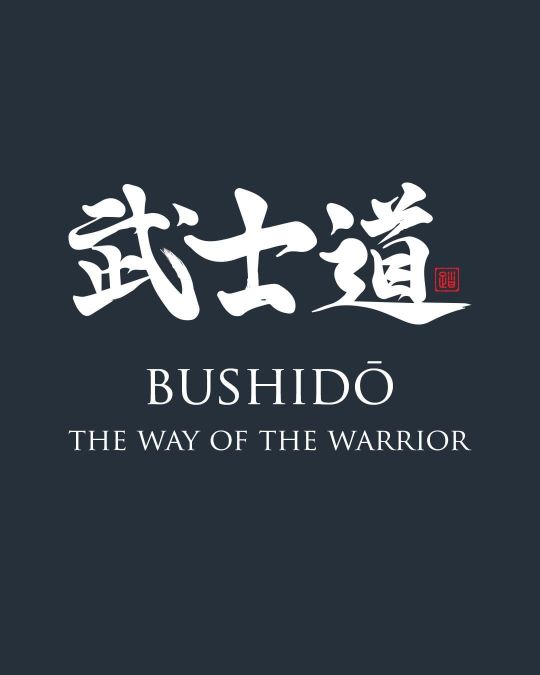
武士道 Bushidō - The way of the warrior Head to the link in the bio to discover more.. Worldwide Shipping // #bushido #japan #japanese #budo #martialarts #budoapparel #budoequipment #budoaccessories #budoshop #redbubble #redbubbleshop #budotshirt #budobackpack https://www.instagram.com/p/CYR8ApTIsFv/?utm_medium=tumblr
#bushido#japan#japanese#budo#martialarts#budoapparel#budoequipment#budoaccessories#budoshop#redbubble#redbubbleshop#budotshirt#budobackpack
1 note
·
View note
Text
@laciefuyu Why do you assume that I’m not part of the culture myself? I debated about the cultural issues between Japan and Chinese in a really long post with wingletblackbird. I’ll give you the link if you want to exchange ideas on this further. But for a point-by-point response I’ll give you the short version.
1) Japan and China: Japanese culture wasn’t just “inspired” by Chinese culture. The Chinese taught them how to read and write. And that started with the old Chinese classics. Classics that were written as early as 600 BC. Such as the Tao De Ching, the Analect, the Art of War. Now, you can say that Japan later diversified into a more militant form of Confucianism. But the original philosophy came from China. Chinese philosophers wrote it, they own it, and the best way to understand the spirit of these philosophies is to read the original text. And that’s all I’m asking for you to understand here, the spirit of the philosophies here.
Conflict unless absolutely necessary came from Sun Tzu, social order by father-son/lord-vassal hierarchy came from Confucius, defense only came from Mo-Tzu, oneness with the heaven and earth came from Taoism (reps being Zhuang Tzu and Lao Tzu).
Bushido is written as 武士道, wu is martial, shi is man and dao is path. Put it together and you can translate it to be called the way of the warrior in English. English speakers only know it as a phrase from Japan, but it and its inherent values were born in China in the Spring and Autuman period. A period when the land was split and wars were very commonplace.
2) Again, I reiterate that the basic ancient philosophy for East Asia did come from one place. Unless, you want to include India? Is that it?
3) The Anakin you see in TPM, and that the only Anakin I was referring in this post, had no symptoms of rebellion or problems with discipline at that time. Discipline has more to do with later training and the learning curve. There’s no reason to believe that Anakin would have the same issues if he had been trained by an order that had a better grasp of those values and philosophies that I mentioned.
And in case you don’t know, getting punished physically for mistakes isn’t limited to martial arts in Ancient China or anywhere else in East Asia. You get punished for using the wrong word, for writing in the wrong order, but not memorizing stuff fast enough, for talking too much. That’s just how the social order was set up. But the thing is, that doesn’t mean a lack of attachment or emotions.
4) Analysis of fiction? Yeah, that’s what a meta is? Which is why I was comparing fiction to fiction. In other words, a universe where people had a better grasp of these inherent values than the Jedi Order ever did. And that was my original intent, to compare how different the set up is between these two universes. Would you rather that I named the universes I based my assessment?
As for the Shi-fu, Sensei and Guru. First of all, those are not equivalents. You can translate it into English however you want. It does not change the fact that Shi-Fu and Tu-er, which emphasizes a father-son relationship, has a much more closer attachment to each other the Master/apprentice relationship of the Jedi.
5) Monks developed a couple forms of martial arts. They’re not the exclusive owners or main developers of it. That being said, there is a difference between a cult and a religious group.
The Jedi Order are NOT monks, at least far from true monks. The definition of monks in Taoism and Zen Buddhism are people who choose to live away from the material world, NOT people who don’t marry and procreate. And by that definition, the Jedi Order, who is deeply involved in politics and actively subdues other sects, do not qualify as monks in my book. As a real world example, the warrior monks of Shaolin are also seen as a group neck-deep in the material world, and nobody in China respects them for their spirituality, even though they are good martial artists.
6) There’s a difference between friends, which requires real attachment and trust, and people you need to work with on a day-to-day basis because you’re all part of the Republic’s institutions. The relationship between Jedi and Senators are more like the latter, no? You never see the Jedi meeting with the senators for anything else other than matters of warfare or politics.
There’s also the issue of cults not allowing friends? Who said that cults are defined that way? If you go by the quantifiable checklist of cult definition, I believe redrikki has it, the Jedi Order is definitely a cult.
Anything else you wanna talk about and unload?
Interesting Thought Experiment: Anakin Skywalker from an Asian POV
I was reading this fanfiction on AO3 of a crossover between Naruto and SW, when I started thinking about the character traits of TPM Anakin from an Eastern Perspective.
And it hit me, Little Ani was a perfectly good kid in TPM. Hell, if the kid had been presented in front of a cache of martial artists in Asia, they’d be fighting each other to get him under their wing, instead of uttering words of foreboding, telling everyone who would listen that this kid is dangerous.
Anakin’s fear and worry for his mother would not have been perceived as signs of darkness but as the wonderful trait of filial piety. In fact, had he been calm and detached the whole time, had he been able to just shrug off the immense feeling of loss at leaving his mother like that, the martial artists would’ve been far more worried and probably would think Anakin to heartless and cold. There’s a common belief that if you could forget your own birth mother so easily, you wouldn’t have much loyalty to your adopted family of warriors either. They would’ve helped the kid in freeing his mother and encouraged him to visit whenever there’s off-time or vacation because most martial artists would recognize the difference between unhealthy, baseless fear and understandable worry for an actual problem that needed to be resolved.
And then there are the other traits, behold the 7 virtues of Bushido, which is a general list of traits and standards that one should uphold to be considered a good human being. Little Ani practically displayed all of these character traits during the events of TPM. Sure, he had anger issues, but the kid’s only nine, there’s still time to help him work through it and teach him how to handle these powers. Another common belief amongst the Chinese: If the student’s already perfect in everything but skillset, what use do you have for a master?
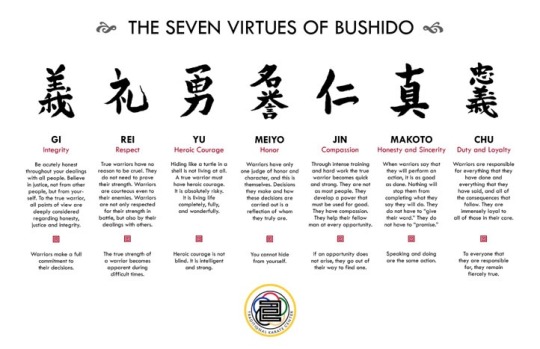
Any martial arts faction would’ve been proud to induct Anakin as an initiate and the master that gets him would be counting his lucky stars for being able to have an apprentice like this. If you see a kid like this in any Wuxia genre story, people would be falling over themselves to praise and befriend him. And yet, the space cult monks only see his darkness. Seriously??!
Bottom Line: Anakin Skywalker was a great kid, perfect af martial artist material but the space cults ruined him. The poor kid would have done so much better as a wandering swordsman or samurai.
FIGHT ME ON THIS, I DARE YOU.
1K notes
·
View notes
Photo
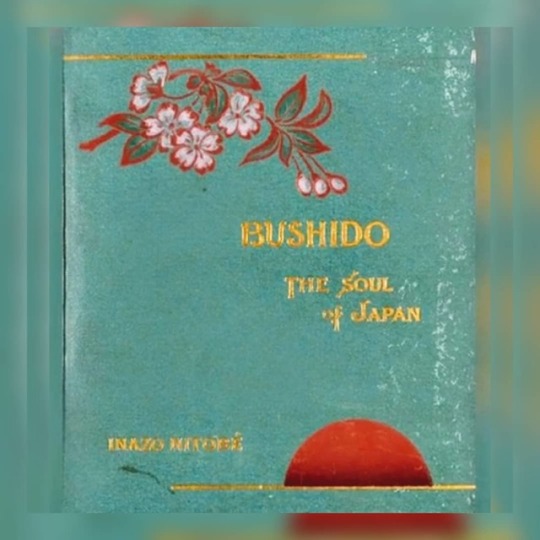
0190912 🇯🇵Bushidō (Japanese 武士道, literally "way (dō) of the warrior (Bushi)"), Germanized Buschido, one understands today the code of conduct and the philosophy of the Japanese military elite whose roots go back to the late Japanese Middle Ages. 🇯🇵 The main features were borrowed from Shinto, Buddhism and Confucianism. 🇯🇵 Its expression and popularity is due to the 1899 in English language work Bushido - the Soul of Japan by Inazo Nitobe. 🇯🇵 In this respect, it is an interspersed with ideals retrospect, the interpretation further in the 20th century and z. T. was instrumentalized. 🇯🇵 When Nitobe wrote his work towards the end of the 19th century and chose the name Bushido, he was unaware that the term already existed. 🇯🇵 🌐🌐🌐 COLLAGE PATTERN-PHOTOGRAPHY ARCHITECTURE-PHOTOGRAPHY ABSTRACT-PHOTOGRAPHY MINIMAL-PHOTOGRAPHY FREE-MINIMALIST-PHOTOGRAPHY MONOCHROME PHOTOGRAPHY #naturephotography #flowerphotography ©️ NORBERT WEBER ©️ All rights reserved (!) #monochromephotowebernorbert #photowebernorbert #monochrome #friend #friends #fun #funny #smile #love #instagood #friendship #happy #cute #photooftheday #forever #bestfriend #lovethem #bestfriends #goodfriends #besties #awesome #memories #goodtimes #goodtime #blackandwhite #bnw #monochrome #instablackandwhite #monoart #bw_lover #photooftheday #bw #bw_society #bw_crew #bwwednesda #igersbnw #bwstyleoftheday #monotone #monochromatic#noir #fineart_photobw https://www.instagram.com/p/B2UHRNQCXBB/?igshid=17xkzapbglwvh
#naturephotography#flowerphotography#monochromephotowebernorbert#photowebernorbert#monochrome#friend#friends#fun#funny#smile#love#instagood#friendship#happy#cute#photooftheday#forever#bestfriend#lovethem#bestfriends#goodfriends#besties#awesome#memories#goodtimes#goodtime#blackandwhite#bnw#instablackandwhite#monoart
0 notes